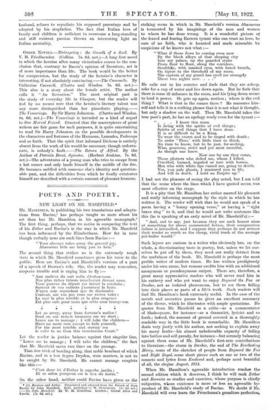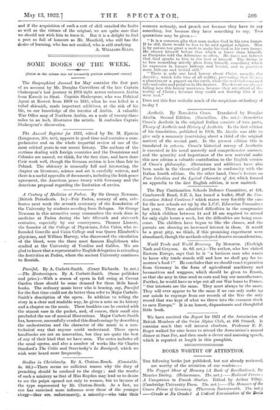POETS AND POETRY.
tions from Racine,' has perhaps taught us more about his art than has Mr. Hamilton in his agreeable monograph.2 The first thing, perhaps, that we notice in comparing the text of his Esther and Racine's is the way in which Mr. Masefield
has been influenced by the Elizabethans. How far in tone though verbally near are such lines from Racine :— " Your absence takes away the general joy, Ahasuerus bids me bring you to him."
The second thing that strikes us is the extremely rough state in which Mr. Masefield sometimes gives his verse to the public. Here are Racine's and Masefield's versions of a part of a speech of Haman's wife. She, the reader may remember, suspects trouble and is urging him to fly :-
" Aux maliees du sort enfin derobez-vous. Nos plus riches tresors marcheront devant nous. Vous pouvez du depart me laisser in conduit° ; Surtout de vos enfants j'assurerai is fuite. N'ayez soin cependant quo de dissimuler. Content, sur vos pas vous me verrez voler La mer la plus terrible et la plus orageuse Est plus sure pour nous que cette tour trompcuse.
Let us away, away from fortune's malice ! Send on our richest treasures ere we start ; Leave me to manage ; I will take the children— Have no more care except to hide yourself, For the most terrible and stormy sea Is safer to us than this treacherous Court."
Let the reader in justice balance against that singular line, " Leave me to manage ; I will take the children," the fact that Mr. Masefield saves two lines on the passage.
That fine trick of bowling along, that noble bombast of which Racine, and in a less degree Dryden, were masters, is not to be caught by Mr. Masefield. He cannot manage couplets like this :- " C'ost done ici d'Esther le superbe jardin ; Et ce salon pompeux est le lieu du festin."
On the other hand, neither could Racine have given us the
• (1) Berenice and Esther. Translated and adapted from the French of Jean Backe by John Masefleld. Both published by W. Heinemann. [2s. 6d. net.] Unwin . <2) Jo [7s. 64.hn •Afneasefield. By W. H. Hamilton. London : George Mice and t.]
striking scene in which in Mr. Masefield's version Ahasuerus is tormented by his imaginings of the men and women to whom he has done wrong. It is a wonderful picture of the feared and fearing Eastern tyrant who can trust no love, be sure of no faith, who is haunted and made miserable by suspicions of he knows not what :--
"What if those Jews be coming even now By the black alleys of that sleeping city Into my palace, up the guarded stairs From floor to floor, along the corridors, Stealthily, with masked eyes, with bated breath, On tiptoe to the threshold of my room. The captain of my guard has eyed me strangely These two nights now. . . ."
He calls out to his sentries and finds that they are asleep, asks for a cup of water and lies down again. But he feels that there is some ill influence in the room, and his lying down seems to lend it power. He gets up again, restless ; where is the evil thing ? What is that in the corner there ? He reassures him- self and tells it in a striking phrase that it is not what it thought, but only a shadow on the wall. Then Mr. Masefield takes the true poet's part, he has an apology ready even for the tyrant :— . . . I know this room Is living with the spirits of evil things ;
Spirits of evil things that I have done.
It is so difficult to be a King, To wear the crown and to be ringed with death ; To order ' Thus,' with little time to think, No time to know, but to be just, far-seeking, Wise, generous, strict and yet Most merciful, As though one knew. Now one by one they come, Those plotters who defied me, whom I killed, Crucified, burned, impaled or tore with horses, Men who with white lips cursed me, going to death.
Yes, you pale ghosts, I mastered you in life,
And will in death. I hold an Empire up."
I had not the pleasure of seeing the play acted, but I am told that the scene where the lines which I have quoted occur, was most effective on the stage.
It is a pity that Mr. Hamilton has rather marred his pleasant and really informing monograph by the style in which he has written it. The reader will wish that he would not speak of a poem having a " bonny opening verse," or having a " right brave ring " to it, and that he would not write sentences like this (he is speaking of an early novel of Mr. Masefield's) :- " And, sad to say, just because they are such honest aims at something far above commercial fiction, their comparative failure is intensified, and I suppose they perhaps do not attract their reader so' much as the cheap, vivid trash of the average pot-boiler would."
Such lapses are curious in a writer who obviously has, on the
whole, a discriminating taste in poetry, but, unless we let our- selves be put off by them, they need not really detract from the usefulness of the book. Mr. Masefield is perhaps the most prolific writer of modern times. He has written prodigiously
under his own name, but rumour credits him with an additional anonymous or pseudonymous output. There are, therefore, a great many appreciative readers who will never read him in his entirety and who yet want to enjoy Reynard the Fox or
Dauber, not as isolated phenomena, but to see them falling into their places as parts of a life's work. Such readers will find Mr. Hamilton's book extremely useful. In the case of the novels and narrative poems he gives an excellent summary of the theme, which he illustrates with ample quotations. Ho quotes from Mr. Masefield as a critic—as a commentator of Shakespeare, for instance—as a dramatist, lyricist and so forth ; ineleed, the amount of ground covered in a thoroughly readable way in the little book is remarkable. Mr. Hamilton deals very justly with his author, not seeking to explain away his many faults—his almost unbelievable capacity of falling into bathos and self-parody, for instance—but serenely balancing against them some of Mr. Masefield's first-rate contributions to literature—the storm in Dauber, the end of The Everlasting Mercy, some of the sketches of people from Reynard the Fox and Right Royal, some short pieces such as one or two of the sonnets and lyrics from Enslaved and, perhaps most beautiful of all, the elegiac August, 1914.
When Mr. Hamilton's agreeable introduction reaches the second edition which it deserves, I think he will rank Esther
and Berenice as studies and exercises, whose purpose is chiefly subjective, whose existence is more or less an agreeable by- product of Mr. Masefield's study of Racine. We doubt if Mr. Masefield will ever learn the Frenchman's grandiose perfection, and if the acquisition of such a sort of skill entailed the faults as well as the virtues of the original, we are quite sure that we should not wish him to learn it. But it is a delight to find a poet so full of honours as Mr. Masefield, who still has the desire of learning, who has not ossified, who is still studying.
A. WILLI A MS- ELLIS.



































 Previous page
Previous page